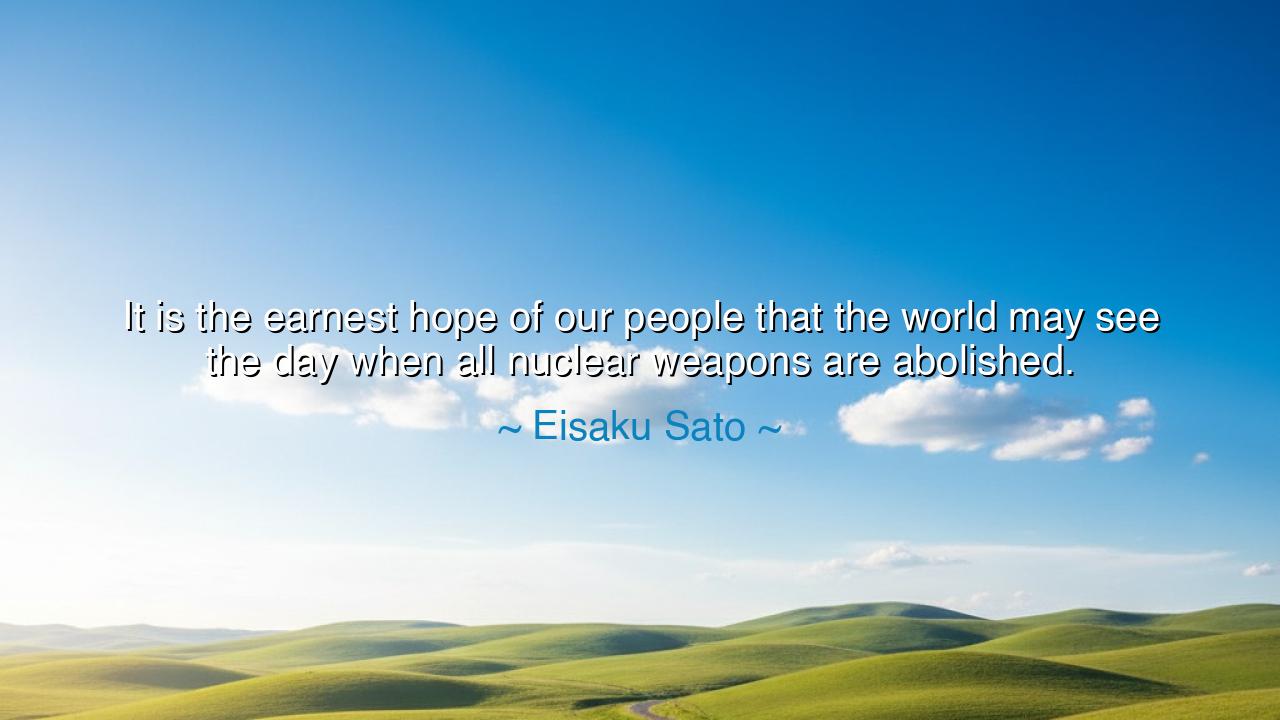
It is the earnest hope of our people that the world may see the
It is the earnest hope of our people that the world may see the day when all nuclear weapons are abolished.






“It is the earnest hope of our people that the world may see the day when all nuclear weapons are abolished.” — thus spoke Eisaku Satō, the Prime Minister of Japan and Nobel Peace Prize laureate, a man who carried upon his shoulders the memory of a nation scarred by fire and shadow. In these words lies the voice of a people who have looked into the abyss — the people of Hiroshima and Nagasaki, who saw the sky burn and the earth itself weep. His declaration is not a mere plea for policy or diplomacy, but a cry from the depths of the human soul — a yearning for redemption after the greatest of human sins: the creation of weapons capable of ending all life.
Satō spoke from a nation that had seen what the world must never see again. When he uttered his “earnest hope”, it was not abstract, but carved from memory and mourning. Japan, the only nation ever to endure nuclear devastation, became the conscience of humankind — a living testament to both the cruelty and the courage of man. From the ashes of 1945 rose not a people of vengeance, but a people of resolve, who chose peace as their highest calling. And so, when Satō expressed the dream of a world without nuclear arms, he was not merely speaking for Japan, but for all who value life over power, and mercy over might.
The origin of this quote lies in Satō’s address to the world during his tenure as prime minister in the late 1960s, a time when the Cold War’s icy grip had hardened global fear into policy. The great powers stockpiled their weapons like dragons guarding their hoards, believing destruction itself to be the guarantor of peace. Against this madness, Satō raised his voice — humble yet resolute — urging the nations to seek a higher path. His vision culminated in Japan’s Three Non-Nuclear Principles: that Japan would neither possess, nor produce, nor permit nuclear weapons within its borders. For this stance of moral leadership, rooted in the deepest wounds of history, he was awarded the Nobel Peace Prize in 1974.
His words recall the wisdom of the ancients who knew that power without restraint brings ruin, that fire ungoverned consumes its master. The philosopher Heraclitus once said that war is the father of all things — but Satō dared to dream of a time when peace might claim that title instead. Like Ashoka, the great Indian emperor who renounced conquest after witnessing the carnage of his own wars, Satō embodied the transformation of suffering into enlightenment. Both leaders turned from the sword to the soul, from domination to compassion, reminding the world that true strength is not found in arsenals, but in restraint.
Consider the fate of the Hibakusha, the survivors of Hiroshima and Nagasaki. Their lives became living scriptures — testimonies of suffering and endurance. They bore scars not only upon their flesh but upon the very spirit of humanity, warning us of what happens when knowledge becomes arrogance, and science divorces itself from wisdom. They, like Satō, prayed that their agony would not be in vain — that future generations might learn from their torment, and that the world might one day lay down its weapons of annihilation. Their hope, though fragile, burns still — a small light defying the darkness of fear.
Yet, Satō’s vision has not yet been fulfilled. The arsenals remain; the bombs sleep, waiting. The nations still cling to deterrence as though fear could ever be a foundation for peace. But his words endure because they challenge us to rise above that fear — to imagine a world not governed by threat, but by trust. His hope is a seed, planted in the conscience of humankind, awaiting the day when courage and compassion are strong enough to make it bloom.
And so, my child, let this be the lesson: peace does not come from treaties alone, nor from weapons hidden underground. It is born in the hearts of people who refuse to accept that destruction is destiny. Each of us carries the power to choose understanding over hatred, cooperation over suspicion, dialogue over division. We must become, as Satō envisioned, the generation that chooses creation over extinction, hope over despair.
For as Eisaku Satō reminds us, the hope for a world without nuclear arms is not a dream for the weak — it is the prayer of the strong. It is the faith of those who have seen the worst of humanity and still believe in its best. Let us, then, keep this earnest hope alive — to build a world where the skies no longer burn, where nations measure their greatness not in weapons, but in wisdom, and where every child born beneath the sun may live without fear of the fire that once consumed the world.






AAdministratorAdministrator
Welcome, honored guests. Please leave a comment, we will respond soon